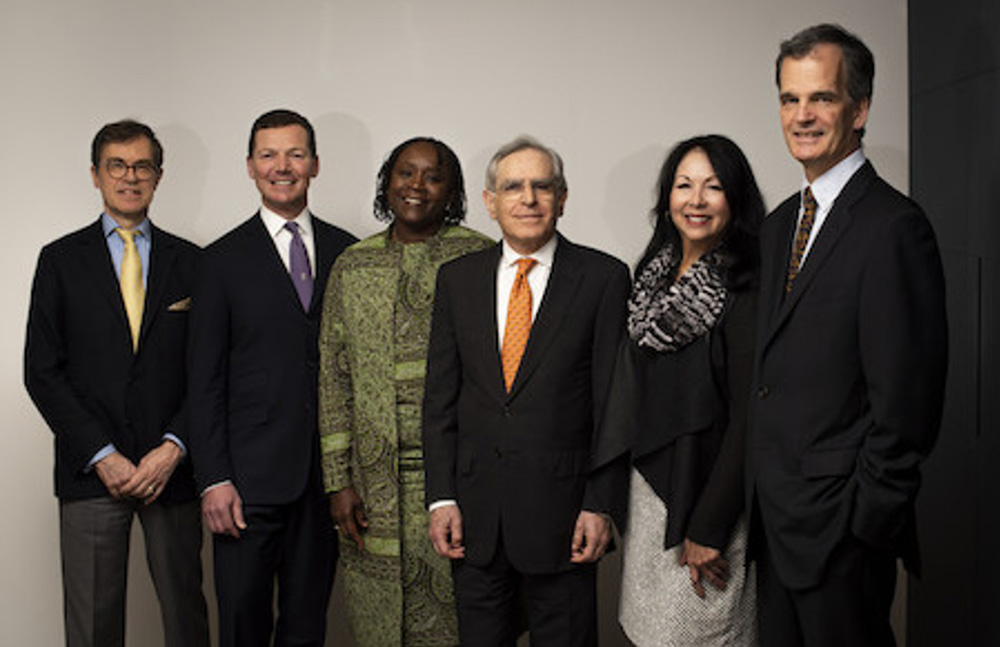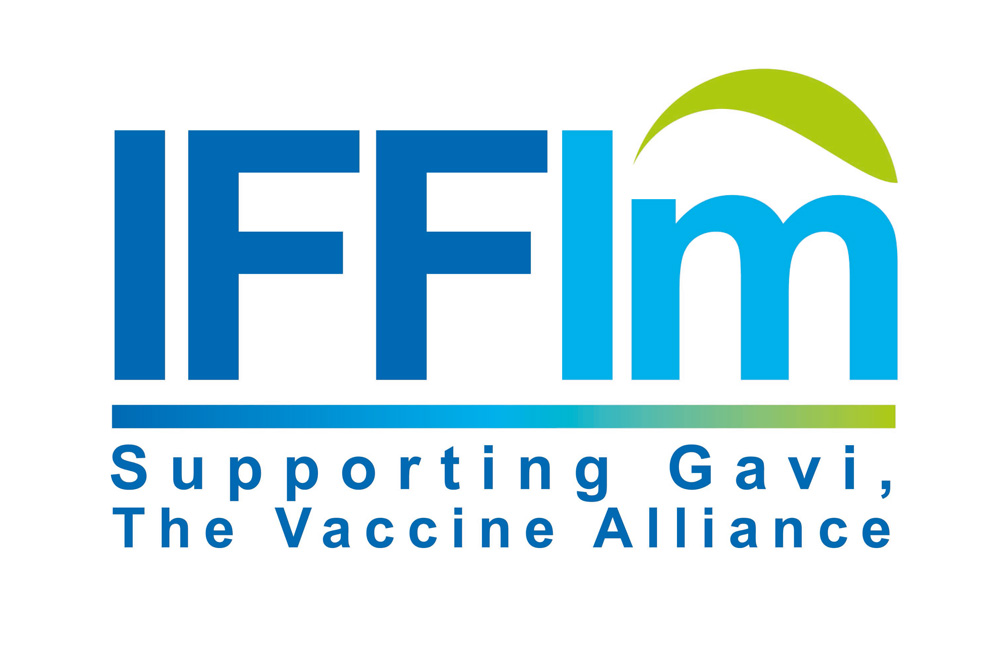The art of innovative finance
The art of innovative finance
29 July 2020

Marcus Fedder (right) together with his IFFIm Board colleagues Doris Herrera-Pol, Cyrus Ardalan, Fatimatou Zahra Diop, Helge Weiner-Trapness and Bertrand Mazières. Credit: Gavi/2020.
An interview with IFFIm Board member Marcus Fedder.
Marcus Fedder joined IFFIm’s board of directors in 2013 bringing his experience in both global development and investment banking to help shepherd IFFIm as it raised US$ 2.5 billion over his seven-year term. Fedder, an active and talented artist whose work supports children in Cambodia, talks about his years with IFFIm.
Describe your background and how you observed IFFIm’s evolution during your board service.
My background is derivatives, capital markets and emerging markets. So when I joined the board, I was really interested in the innovative structure, and from my work in microfinance, particularly in Cambodia, I knew how crucially important vaccination is for the poorest people at the bottom of the pyramid.
Around the time I joined, IFFIm was changing from being the key provider of funding for Gavi to becoming one of Gavi’s financing options as they received significant contributions from donors in the 2015 replenishment. Frontloading, so critical in the beginning, looked to be less important for a while. But then CEPI (Coalition for Epidemic Preparedness Innovations) was created and in 2019 and used IFFIm to frontload Norwegian multi-year pledges for work to develop new vaccines against deadly diseases. How timely was that? And now, it is clear that IFFIm will be needed more than ever to finance vaccination of the poorest in the global fight against COVID-19.
What did you learn about IFFIm’s impact from visits to Gavi supported countries?
Wherever you go in Gavi-supported countries, and I have been to a number of them, pentavalent vaccines are a high priority. IFFIm funded more than 90% of the initial vaccine cost for Gavi’s pentavalent programme. When you can put money on the table, it gives you a stronger negotiating power. Gavi nowadays procures these vaccines for $0.938 a shot – a price drop of more than 69% since 2010.
My most memorable funny anecdote from a field visit was with Gavi in Côte d’Ivoire in 2016. We were received miles from Abidjan by the local King and his entourage. Next to his health centre, which included a modern cold chain facility and had a very pro-active health and vaccination programme, his pride was his massive liquor cabinet consisting of at least 100 bottles, which he urged us to sample in pentavalent doses, whilst kids were being vaccinated next door. At ten in the morning, it was clear that most of us in the group would have preferred an additional vaccine- rather than a liquor shot!
How have financial markets evolved since IFFIm was founded?
IFFIm issues Vaccine Bonds. These fall into the broader category of sustainable bonds and constitute a socially responsible investment, a sometimes blurry term. But the nice thing about Vaccine Bonds is that they are such a straightforward investment, as they fund a single purpose and so clearly contribute to the third Sustainable Development Goal to promote better health worldwide. Back in 2006, when IFFIm issued its first bonds, there was no such sustainable bond market. In fact, it started only in 2013, and IFFIm, through its issuances, pioneered this sector. Nowadays, IFFIm’s Vaccine Bonds are high in demand, as the message for investors is so clear: buying Vaccine Bonds helps save lives.
Has your creative work as a painter influenced your work in finance?
People working in finance often have a very short attention span. At least I am suffering from that. But when I paint, I can concentrate for a long time. Well, a long time for my standards, certainly not for those of a professional artist. This has definitely helped me dealing with IFFIm papers and long documents. Creativity also helps in thinking of out-of-the-box solutions. By the way, the proceeds from my paintings go to support a charity, Children of the Mekong. www.childrenofthemekong.org
What do you think is next for IFFIm in terms of potential?
COVID-19 is a classical case for IFFIm. As soon as a vaccine is developed and tested, it needs to be rolled out to every country, and Gavi needs to roll it out to its constituents – the poorest countries of the world. This has to happen in one big swoop, you cannot do it piecemeal. IFFIm will help by being a mechanism to frontload governments’ multi-year donations to fight the virus in these poorest countries. I really do hope that this great financing mechanism will be fully replenished1 and utilised.
Marcus Fedder, IFFIm board member from 2013-2019, is a Non-Executive Director of The Currency Exchange Fund (TCX) and a co-founder of Amnexis, a start-up in the digital med sector. He also advises development finance institutions and co-founded a microfinance operator. Mr Fedder was a Vice-Chair of TD Securities, responsible for the business of Toronto Dominion Bank in Europe and Asia-Pacific and served as treasurer of the European Bank for Reconstruction and Development (EBRD) and earlier as an advisor to governments and central banks while working for the World Bank.
1 IFFIm raised $926 million in new pledges during the Global Vaccine Summit on 4 June 2020, exceeding its replenishment target.
Share this article
Restricted Access Library
 The material in this Restricted Access Library is intended to be accessed only by persons with residence within the territory of a Member State of the European Union and is not intended to be viewed by any other persons. The material in this Restricted Access Library is provided by IFFIm for information purposes only and the materials contained herein were accurate only as of their respective dates. Certain information in the materials contained herein is not intended to be, and is not, current. IFFIm accepts no obligation to update any material contained herein.
The material in this Restricted Access Library is intended to be accessed only by persons with residence within the territory of a Member State of the European Union and is not intended to be viewed by any other persons. The material in this Restricted Access Library is provided by IFFIm for information purposes only and the materials contained herein were accurate only as of their respective dates. Certain information in the materials contained herein is not intended to be, and is not, current. IFFIm accepts no obligation to update any material contained herein.
Persons with residence outside the territory of a Member State of the European Union who have access to or consult any materials posted in this Restricted Access Library should refrain from any action in respect of the securities referred to in such materials and are otherwise required to comply with all applicable laws and regulations in their country of residence.
By clicking Access restricted content: DYNAMIC-LINK-TEXT I confirm that I have read and understood the foregoing and agree that I will be bound by the restrictions and conditions set forth on this page.
The materials in this Restricted Access Library are for distribution only to persons who are not a "retail client" within the meaning of section 761G of the Corporations Act 2001 of Australia and are also sophisticated investors, professional investors or other investors in respect of whom disclosure is not required under Part 6D.2 of the Corporations Act 2001 of Australia and, in all cases, in such circumstances as may be permitted by applicable law in any jurisdiction in which an investor may be located.
The materials in this Restricted Access Library and any documents linked from it are not for access or distribution in any jurisdiction where such access or distribution would be illegal. All of the securities referred to in this Restricted Access Library and in the linked documents have been sold and delivered. The information contained herein and therein does not constitute an offer for sale in the United States or in any other country. The securities described herein and therein have not been, and will not be, registered under the U.S. Securities Act of 1933, as amended (the "Securities Act"), and may not be offered or sold in the United States except pursuant to an exemption from, or in a transaction not subject to, the registration requirements of the Securities Act and in compliance with any applicable state securities laws.
Each person accessing the Restricted Access Library confirms that they are a person who is entitled to do so under all applicable laws, regulations and directives in all applicable jurisdictions. Neither IFFIm nor any of their directors, employees, agents or advisers accepts any liability whatsoever for any loss (including, without limitation, any liability arising from any fault or negligence on the part of IFFIm or its respective directors, employees, agents or advisers) arising from access to Restricted Access Library by any person not entitled to do so.
"Relief" for mothers in Bayelsa state as malaria vaccine makes waves
07 November 2025
